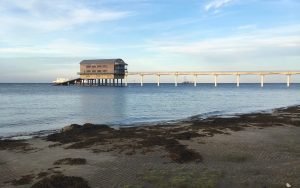Having just found my feet in London after graduating last summer, it’s safe to say there was a helping of resentment in my decision to move back to my family home to wait out the worst of the pandemic. Contrary to popular opinion, I hadn’t particularly enjoyed growing up on the Isle of Wight, but during lockdown I’ve started to see it in a new light.
Rose-tinted depictions of this diamond stitched into the middle of the Solent can be found across literature, from Jane Austen’s dreamy musings of the place she calls “The Island, as if there were no other island in the world” (which, incidentally, you’ll find as every second caption on IOW-related Instagram posts), to ferry travel guides describing the place as “the UK’s island paradise” (although I imagine a ticket to actual paradise would be more reasonably priced than a period return to this particular beachy isle).

Visitors to the island would often comment on its idyllic nature, particularly as a place to grow up. But not for me – with a phobia of boats and a passionate distaste for sand, this isolated lump of land felt increasingly prison-like the older I became. And yes, I lived surrounded by water on an island renowned worldwide for its sailing and I was scared of boats – the irony wasn’t lost on me. Popping to London for the day as a mainlander was a simple matter of boarding a train – as a ferry-phobic islander it was a stressful undertaking comprising of “the green test” (examining passengers leaving the ferry for signs of queasiness to assess how choppy the ferry would be), paying careful attention to crew announcements (a “mild crossing” was acceptable; “moderate” or “rough” and my stomach would turn as I eyed up the closing doors), and a rigid adherence to watch-checking to ensure that we didn’t miss the last ferry home (and then repeat steps one and two).
My fear of boats trailed after me until I was midway through my studies at university, and finally faded during a year abroad that had me tackling far greater challenges than a 25-minute catamaran crossing. What never really dissipated was my indifference to the island itself – boat-induced panic no longer prevented me from travelling back and forth, but apart from seeing family, I had no desire to. The views were nice – gorgeous in fact – but they lacked the buzz of adventure I’d found further afield, not to mention the incredible groups of friends I’d met and grown to depend on along the way.
“But those 16 weeks have given me a sense of appreciation for the place where I grew up.”
As a result, I had absolutely no intention of moving back home after graduating, but Covid-19 has shown a blatant disregard for all intent and plans since it came crashing out of Wuhan seven months ago. Faced with the choice of being confined to a cramped house-share with strangers in a locked down city or a slightly less cramped house with far more amicable housemates and regular roast dinners, it wasn’t long into the pandemic before I packed my bags and headed to the Isle of Wight.
The last three months have been littered with personal obstacles; one of the worst being the nuanced feelings of loneliness that the claustrophobic nature of an island seems to exacerbate. But those 16 weeks have given me a sense of appreciation for the place where I grew up.

There is something delicious in the smell of freshly washed-up seaweed (a fact that my 15-year old self adamantly protested whenever my mum pointed it out).
The brisk freshness of the air is life-affirming, particularly compared to the London smog that slicks your pores in minutes (although you’d have a hard job telling my skin that, but we can hold stress-induced over-consumption of Percy Pig and his friends partially responsible for that particular month-long outbreak).
And actually, sand isn’t that bad (when you’re suitably dressed – I’m not at a point of acceptance where I’m happy to have those gritty bits of pulverised rock dancing around in my socks quite yet).
I miss my pre-pandemic life a lot, but Austen might’ve been onto something about “The Island” – there are much worse places to wait out a pandemic (and the beach does make for a fantastically scenic wallowing spot).
Hannah Ward-Glenton
Featured image courtesy of author.

